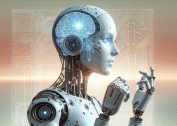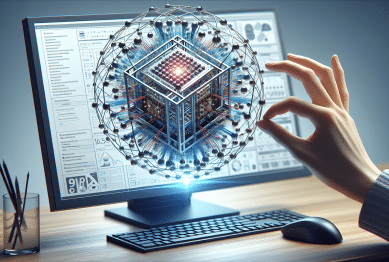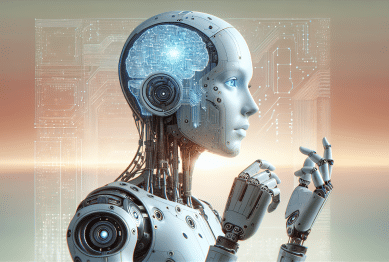Artificial intelligence keeps evolving, changing how people interact with technology and science. This guide explores how AI influences everyday life, career opportunities, and scientific discovery, while also addressing challenges, ethics, and what to expect as innovation accelerates.
AI Growth and Everyday Impact
Artificial intelligence is becoming part of everyday experiences worldwide, even if people aren’t always aware of its presence. Devices at home, search engines, chatbots, and streaming services all use sophisticated algorithms to serve content and anticipate user preferences. This subtle integration into daily routines continues to change the way individuals interact with familiar technology, sometimes making tasks feel almost effortless. AI can recommend a video, correct spelling, or even help schedule appointments with minimal involvement from humans.
You may notice that certain online ads seem uncannily relevant or that music recommendations perfectly match the mood. Such personalization reflects the depth of AI’s pattern-recognition skills. These algorithms learn from countless data points, including browsing history, shopping behavior, and stated preferences, to offer content that feels tailored. It’s no longer just big tech companies using these algorithms; schools, hospitals, and local governments now rely on AI for decisions, predictions, and communication every day.
The social effect of artificial intelligence can be both subtle and profound. Some workplaces already use AI-powered scheduling to fill shifts efficiently. Healthcare providers analyze records using AI tools to proactively spot trends. While these shifts may go unnoticed, they reveal how deeply this technology influences modern life. Understanding these small but significant impacts can help people better navigate an increasingly smart environment and use these systems more effectively. (Source: https://www.brookings.edu/articles/artificial-intelligence-in-daily-life/)
AI in Science and Research
Researchers across diverse fields depend on artificial intelligence to analyze data, produce simulations, and even suggest new scientific hypotheses. In medical science, for example, AI helps identify disease patterns and potential drug interactions faster than traditional methods. This efficiency saves both time and resources, opening new doors for innovation. Climate researchers also use sophisticated AI models to predict weather changes and study environmental shifts more accurately than previous generations of tools ever could.
Scientific discoveries benefit from AI’s ability to process huge volumes of information. Machine learning algorithms can spot connections humans might miss, leading to hypotheses about disease genetics or material science. These connections sometimes prompt entirely new research directions. As a result, AI is credited with accelerating progress in complex disciplines ranging from chemistry to astrophysics, where analyzing large datasets was once an overwhelming barrier to entry.
Partnerships between research scientists and AI developers help drive discovery. Evidence shows fields like environmental science, genomics, and pharmaceutical development are improving both accuracy and speed. By freeing scientists from repetitive analysis, AI enables a focus on experiment design and interpretation. This synergy leads to richer discoveries and increases the likelihood of impactful breakthroughs. (Source: https://www.nsf.gov/discoveries/disc_summ.jsp?cntn_id=301306)
Understanding AI Algorithms
Most artificial intelligence programs work thanks to clever algorithms—sets of instructions that enable learning by example. These systems process large datasets to recognize patterns and can adjust their output based on feedback, making them more sophisticated over time. In machine learning, the system builds models using sample data so it can generalize and make predictions on new information. Many people interact with these models every time they conduct a search or receive personalized news feeds.
Deep learning, a subset of machine learning, is inspired by how the human brain works, using neural networks with various layers. Each layer helps the system learn different features from the data, ranging from simple shapes to complex objects in images. These methods have already led to significant advances in image recognition, sound processing, and language translation. How a device recognizes speech or organizes photos depends on how well its deep learning model has been honed.
Continuous algorithm improvement sets artificial intelligence apart from earlier automation. As these systems handle more diverse and complex information, updates and refinements help AI recognize more subtle distinctions. Open-source projects and collaborative academic research push these improvements further, often sharing breakthroughs that benefit the whole tech ecosystem. Learning about these underlying mechanisms can demystify technology and encourage wider engagement with innovation. (Source: https://ai.google/education/)
Opportunities and Careers in Artificial Intelligence
The growth of artificial intelligence is creating new roles for specialists and reshaping existing ones. Data analysts, machine learning engineers, AI trainers, and algorithm designers all find opportunities in both public and private sectors. As adoption spreads, demand for individuals with skills in programming, data science, and neural networks continues to increase. Many universities now offer AI-related courses or collaborative degrees to prepare students for this evolving field.
Not everyone needs advanced technical skills to benefit from AI advancements. Organizations also need those who can manage projects, evaluate ethical implications, or translate complex findings into actionable strategy. Educational projects and self-paced online training enable broader access to foundational artificial intelligence knowledge. Interested individuals might explore learning resources like those offered by Coursera or edX, which regularly update content in partnership with engineers and scientists.
Career paths in AI extend beyond big tech companies. Sectors like finance, manufacturing, logistics, and medicine seek expertise in artificial intelligence to improve operations and profitability. Understanding what drives demand for these skills can help job seekers and career changers plan accordingly. Those able to combine AI literacy with domain expertise are particularly well-positioned for ongoing success. (Source: https://www.coursera.org/articles/ai-careers)
AI Ethics and Trust in Technology
With great capability comes responsibility. Artificial intelligence systems sometimes inherit or amplify social biases found in their training data, affecting outcomes in everything from loan approvals to healthcare recommendations. As a result, experts emphasize transparency, explainability, and fairness when building or using AI solutions. Knowing how decisions are made by these systems is crucial for building public trust and avoiding unintended consequences.
Governments, universities, and advocacy groups are already developing guidelines and legal frameworks to encourage responsible artificial intelligence development. These include recommendations for open audits, representative datasets, and routine impact assessments of deployed systems. Addressing these concerns is not only ethical but can also improve public perception and adoption of new AI-driven products and solutions. Clear standards help users appreciate both the value and the potential risks of this rapidly changing technology.
Ethical AI is an evolving field, with ongoing debate about privacy, accountability, and decision-making authority. Researchers work alongside policymakers to recommend safe standards for everything from facial recognition to automated decision-making in public services. These conversations often lead to new safeguards that can help ensure AI benefits as many people as possible. (Source: https://aiethicslab.com/ethics-in-ai/)
The Future of Artificial Intelligence
People frequently wonder what comes next as artificial intelligence integrates more deeply with daily routines and scientific advancement. Experts predict that AI will continue to streamline tasks, enhance creativity, and provide solutions to challenges from disease control to climate change. At the same time, potential disruptions, such as job automation and evolving privacy expectations, provoke thoughtful discussion and adaptation.
Some intriguing areas of expected growth include collaborative robotics, natural language processing, and intelligent digital assistants. These tools are likely to impact fields ranging from agriculture and education to urban planning and space exploration. As sensors, processors, and algorithms improve, the range of AI-driven applications will also expand. Ongoing research, open dialogue, and cross-disciplinary cooperation will likely drive the field forward.
Ultimately, embracing change while staying informed about artificial intelligence can empower people to harness its potential more fully. Sound policies, ethical guardrails, and accessible education can provide the framework for safe exploration and responsible growth. Exploring and understanding these trends means anyone can better prepare for technology’s evolving role in society. (Source: https://www.nature.com/articles/d41586-019-02209-9)
References
1. Brookings Institution. (n.d.). Artificial intelligence in daily life. Retrieved from https://www.brookings.edu/articles/artificial-intelligence-in-daily-life/
2. National Science Foundation. (n.d.). AI accelerates scientific discovery. Retrieved from https://www.nsf.gov/discoveries/disc_summ.jsp?cntn_id=301306
3. Google AI. (n.d.). Education and resources. Retrieved from https://ai.google/education/
4. Coursera. (n.d.). Careers in artificial intelligence. Retrieved from https://www.coursera.org/articles/ai-careers
5. AI Ethics Lab. (n.d.). Ethics in AI. Retrieved from https://aiethicslab.com/ethics-in-ai/
6. Woolston, C. (Nature). (n.d.). Artificial intelligence keeps surprising scientists. Retrieved from https://www.nature.com/articles/d41586-019-02209-9









